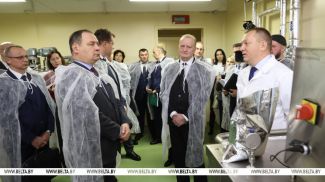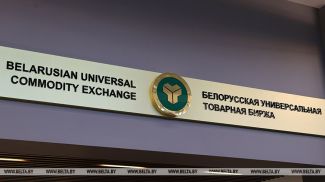MINSK, 25 June (BelTA) - The Belarusian Universal Commodity Exchange (BUCE) predicts further growth of prices for dairy products sold on the commodity exchange for export, BUCE spokesman Roman Yaniv told BelTA.
BUCE analysts expect a further increase in prices for dairy products sold via BUCE. This will be facilitated by the favorable trends in foreign markets and the high concentration of foreign buyers on the exchange.
Export quotations for the main types of dairy products have showed positive dynamics throughout 2021. "For example, prices for butter and skimmed milk powder have increased by 5-10%, and, apparently, this is not the limit.
The main reason is the increase in world prices, due to the decline in production in the wake of adverse weather conditions in the EU and Oceania and high demand in China, which is recovering faster than other Asian countries from the pandemic. All this time Belarusian exporters have actively used the exchange mechanism not only because of the favorable price trends but also of the desire to maximize revenue in the competitive environment created at BUCE," Roman Yaniv said.
The domestic dairy plants have had enough warehouses stocks and put up bigger lots for auction. Last year Belarusian enterprises preferred over-the-counter sales. This year the amount of deals to sell powdered milk on BUCE increased by 5.3 times, and that of butter - 39 times.
"Given the stable demand in key markets and the activity of buyers at BUCE, most likely the upward price trend will continue. At the same time, we cannot rule out the impact of the risks associated with the ongoing pandemic, which may increase volatility in the Belarusian stock exchange market," BUCE analysts said.
The public joint-stock company (OAO) Belarusian Universal Commodity Exchange was established in 2004. The first trade sessions took place in June 2005. BUCE is one of the largest mercantile exchanges in Eastern Europe. Its key function is to assist Belarusian companies with exporting their products and assist foreign companies with entering the Belarusian market. The commodity exchange facilitates trade in metals, timber, agricultural products, and a broad choice of industrial and consumer goods.












